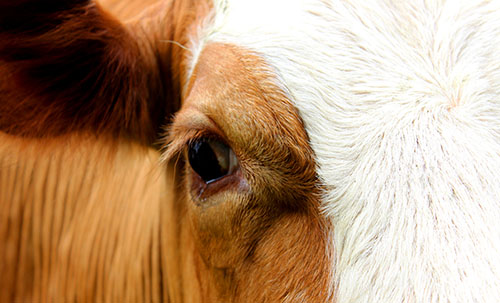Pinkeye Thoughts
May 15, 2023

For cattle producers, summer is the season of several concerns not the least of which is pinkeye. Though pinkeye can be a tough disease to control, a thorough understanding of this disease will make dealing with this troublesome infection less frustrating.
Pinkeye is a bacterial infection that infects the eyes of cattle and is transmitted by the face fly. Most of these infections are caused by Moraxella bovis. Symptoms of pinkeye can vary and may be mild to severe. Many cases start out as excessive tearing or “watering” of the eye. Cattle may be sensitive to light and may have a visible “spot” in the eye. Some cases may progress to corneal edema which appears as a blue-colored eye or possibly even to a full-blown abscess of the eye. Most cases of pinkeye respond well to injectable oxytetracycline. The long-acting product works well since many cases will not have to be treated more than once with that product. Some resistant strains or the bovoculi strain may require a stronger antibiotic for treatment.
Controlling pinkeye must be a multifaceted approach. Since pinkeye is transmitted by the face fly, the cornerstone of any control program must be fly control. Face fly ear tags are essential to good fly control. The recommendation is one tag in each ear of adult cattle and one tag for calves. Measures to control eye irritation are also important; therefore, keeping pastures clipped is extremely important. Vaccination is another key component of good pinkeye prevention. Currently, available vaccines do a good job of helping prevent Moraxella bovis. Some recent research even suggests that vaccination in the face of a pinkeye outbreak has some benefit in controlling/preventing new cases of pinkeye. Finally, making sure that the animal is in a good nutritional plan will ensure that the immune system is able to function at its best. This will allow vaccines to work properly and also ensure the animal’s natural defenses are fully effective.
While pinkeye can certainly be a challenging summer problem, a full understanding of this infection can help mitigate some of the difficulties associated with the infection.
Check with your local Coop to find health and nutritional products that can help control and/or prevent pinkeye. For more content like this, check out the latest issue of The Cooperator.
Pinkeye is a bacterial infection that infects the eyes of cattle and is transmitted by the face fly. Most of these infections are caused by Moraxella bovis. Symptoms of pinkeye can vary and may be mild to severe. Many cases start out as excessive tearing or “watering” of the eye. Cattle may be sensitive to light and may have a visible “spot” in the eye. Some cases may progress to corneal edema which appears as a blue-colored eye or possibly even to a full-blown abscess of the eye. Most cases of pinkeye respond well to injectable oxytetracycline. The long-acting product works well since many cases will not have to be treated more than once with that product. Some resistant strains or the bovoculi strain may require a stronger antibiotic for treatment.
Controlling pinkeye must be a multifaceted approach. Since pinkeye is transmitted by the face fly, the cornerstone of any control program must be fly control. Face fly ear tags are essential to good fly control. The recommendation is one tag in each ear of adult cattle and one tag for calves. Measures to control eye irritation are also important; therefore, keeping pastures clipped is extremely important. Vaccination is another key component of good pinkeye prevention. Currently, available vaccines do a good job of helping prevent Moraxella bovis. Some recent research even suggests that vaccination in the face of a pinkeye outbreak has some benefit in controlling/preventing new cases of pinkeye. Finally, making sure that the animal is in a good nutritional plan will ensure that the immune system is able to function at its best. This will allow vaccines to work properly and also ensure the animal’s natural defenses are fully effective.
While pinkeye can certainly be a challenging summer problem, a full understanding of this infection can help mitigate some of the difficulties associated with the infection.
Check with your local Coop to find health and nutritional products that can help control and/or prevent pinkeye. For more content like this, check out the latest issue of The Cooperator.